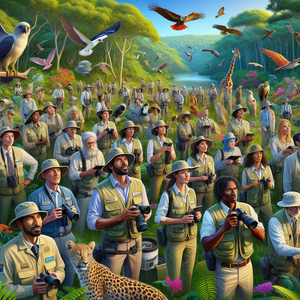
Exploring 15 Fulfilling Career Paths for Zoology Graduates: Embracing Animal Conservation and Research
Graduating with a degree in zoology opens a world of diverse and rewarding career opportunities that contribute significantly to animal conservation, research, and education. Zoology graduates can pursue a variety of roles, from wildlife biologists to veterinarians, each playing a crucial part in safeguarding animal welfare and ecosystems.
Job Summaries:
Zoologist:
- Zoologists conduct in-depth investigations into animal behavior and their interactions within ecosystems.
- They perform research in both natural and controlled settings.
- Typically, a bachelor's degree in zoology or a similar field is the minimum requirement.
- Many advanced research roles necessitate a master's or doctoral degree.
- These professionals are pivotal in conservation initiatives and biodiversity studies.
- They enrich our ecological comprehension.
- Job seekers often find opportunities within educational institutions and research organizations.
Wildlife Biologist:
- Specializing in wildlife populations, behaviors, and habitats.
- Wildlife biologists engage in extensive field research to collect data on species health and environmental stressors.
- Most positions require at least a bachelor's degree in zoology or biology.
- Advanced roles often call for a master's degree.
- These biologists work for conservation agencies, non-profits, and government bodies.
- They profoundly influence wildlife management and habitat conservation.
Veterinarian:
- Veterinarians play a crucial role in diagnosing and treating animal illnesses.
- They work with a range of animals from household pets to wild species.
- A Doctor of Veterinary Medicine (DVM) degree is required for this career path.
- Successful completion of a licensing exam is necessary.
- Specializations in areas like zoological medicine allow veterinarians to care for exotic animals.
- Veterinarians ensure the health and well-being of animals.
- This career path can lead to research or teaching opportunities.
Zookeeper:
- Zookeepers are responsible for the daily care of animals in zoos and aquariums.
- Responsibilities include feeding, habitat upkeep, and health monitoring.
- A degree in zoology or animal science is favored.
- Hands-on experience in animal care is important.
- Zookeepers promote animal welfare and engage the public through educational initiatives.
- They have a significant impact on conservation efforts.
Animal Behaviorist:
- Animal behaviorists study animal conduct in various environments.
- They use their findings to improve welfare and training methods.
- A solid background in psychology, biology, or zoology is essential.
- Many professionals hold advanced degrees.
- Their work spans research, clinical settings, and consultancy.
- Their work enhances our understanding of animal needs and behaviors.
Marine Biologist:
- Focusing on ocean ecosystems, marine biologists explore marine organisms and their interactions.
- A bachelor’s degree with a specialization in marine science or ecology is typically required, with many pursuing advanced degrees for research roles.
- These scientists contribute to conservation efforts and address climate change issues affecting marine life, working across academic, governmental, and private sectors.
Environmental Consultant:
- Environmental consultants assess the impacts of human activities on ecosystems, advising on sustainable practices.
- A degree in zoology, environmental science, or a related discipline is crucial, paired with strong analytical abilities.
- This position often involves field studies and regulatory compliance, significantly influencing conservation and policy advancements.
Veterinary Technician:
- Veterinary technicians assist veterinarians in diagnosing and treating animals.
- They conduct lab tests, administer medications, and provide post-operative care.
- An associate degree in veterinary technology is required, along with certification.
- This role is vital for maintaining animal health.
- Veterinary technicians support veterinary operations across clinics, hospitals, and zoos.
Animal Nutritionist:
- Animal nutritionists create specialized diets to promote health and well-being across various species.
- A degree in zoology, animal science, or nutrition is often necessary.
- They work in research, zoos, or agricultural settings, ensuring optimal nutrition for wildlife and domestic animals.
- They support conservation initiatives.
Research Scientist (Life Sciences):
- Life sciences research scientists explore animal biology and ecology through experiments.
- Higher-level positions typically require a doctoral degree.
- Their investigations can lead to significant advancements in conservation strategies, animal health, and environmental understanding.
Park Ranger:
- Park rangers manage wildlife and natural resources within protected areas.
- They conduct educational programs and enforce regulations.
- A background in wildlife management, biology, or zoology is advantageous.
- Many roles require a degree.
- They play a crucial part in conservation efforts.
- They educate the public about environmental stewardship.
Fisheries Officer:
- Fisheries officers oversee fish populations and advocate for sustainable fishing practices.
- A degree in zoology or marine biology is typically required, along with expertise in aquatic ecosystems.
- They work for government agencies, non-profits, or research organizations, contributing to aquatic conservation efforts.
Science Writer:
- Communicating complex scientific ideas to the public.
- Science writers create articles and blogs that raise awareness about animal conservation and research.
- A strong background in zoology or biology is essential.
- Exceptional writing skills are essential.
- They work with publications, educational institutions, or as freelancers.
- They bridge the gap between science and the community.
Aquarist:
- Aquarists are responsible for the care of aquatic animals in aquariums.
- They focus on habitat maintenance and public education.
- A degree in zoology, marine biology, or a related discipline is often necessary.
- Practical experience is also important for this role.
- Their role is vital in promoting conservation.
- They educate the public about marine ecosystems.
Environmental Educator:
- Environmental educators engage communities in wildlife conservation and environmental stewardship through workshops and educational programs.
- A background in zoology or education is beneficial.
- This position is essential for nurturing awareness and appreciation for wildlife and ecosystems among the public.
As you explore these varied career options, zoology graduates can find fulfilling roles that significantly impact the preservation and understanding of animal life. The abundance of resources and job opportunities in this field creates an exciting landscape for those pursuing a career in zoology. Consider seeking job listings and networking with professionals in the industry to gain valuable insights and discover opportunities that align with your passions for animal conservation and research.
Explore More Jobs

